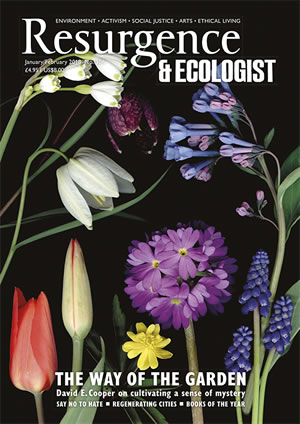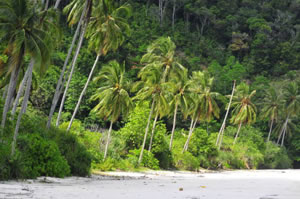A FEW years ago, while on visit to Malaysia to lecture in Kuala Lumpur, I took some time to visit the island of Pulau Redang and explore its tropical ecosystems. I was deeply impressed, yet the ultimate “paradise island” of white sand, crystal-clear water and mega diverse ecosystems opened my eyes to the larger issues our world is facing.
Very early in the morning I came to the beach to meditate, closing my eyes and listening to the sound of the waves. Suddenly a loud noise interrupted my meditation. Teenagers. On motorbikes. Racing. On the most beautiful beach I had ever seen. As if challenged, the young riders turned around, as if wanting to say: “What's up, man? This is our island, we do what we want here.”
I soon realized that almost everyone was using combustion engines for transportation on the tiny 6km island, which has only one major street. It is very hot most of the day and higher speed creates some air movement. Right, I thought, but where are the straw hats? Where are the bicycles, for heavens' sake? But I saw none.
Exploring the island further, I realised that oil has to be brought from the mainland to produce electricity, which is used in several expensive hotels charging up to £300 per night. This on an island where there is abundant sunshine throughout the year, and where using solar panels would be very easy.
I also learned that the island is famous for the conservation of sea turtles, and so headed to another beach in the afternoon. To my surprise, no turtles were to be seen; instead, a huge diversity of plastic: white, red, blue, black, all kinds and shapes, littered the sand. It was simply astonishing.
I asked the staff back at my hotel why there was so much rubbish on the beach and the answer was: “We are in the Monsoon season, sir. The beach is closed". He was not getting the point either. I later noticed that both the tourists and the locals left discarded soft-drinks bottles lying around on the beach, even though there was a huge rubbish bin near by. What caused this? Laziness? Indifference? Lack of knowledge?
I next decided to take a walk, and crossed the jungle along the little stream that connected the wetland with the sea. After careful examination, it became apparent that the water in the stream was not completely transparent and might have been affected by the sewage and the soapy water from the human activities on the island. Water, waste, transport, energy; everywhere I saw new issues and was thinking of the way to solve them. There is a clear need to organize an educational trip to the island to teach the communities to preserve the precious ecosystems that they have, offering them alternatives and explaining the dangers of unprocessed plastics in the coastal environment.
In his recent article There’s a Way: Now We Need a Will (Resurgence & Ecologist Issue 305), Oliver Tickell writes about possible solutions to the plastics problem, focusing mostly at the international level and highlighting the potential role of the AOSIS (Alliance of Small Island States) group of countries. I agree. At the same time, this is not enough. We have to make sure that our own, western giants of retail, such as M&S, Sainsbury’s, Tesco, Waitrose, Walmart, Costco and so on abandon the practice of using plastics, the material that virtually lasts forever but only serves once.
There is new research conducted by the University of Exeter that found plastics in the North Pole. The campaigners like actor and film maker Jeremy Irons, the ocean advocates Alexandra Cousteau, Capitain Moore and Emily Penn or inventor Boyan Slat are drawing our attention to the seriousness of the issue of plastics pollution and trying to find solutions for cleaning our oceans. The task will be futile, however, if we do not stop the flow of plastics pollution at source.
How can we make sure that the leading universities, like MIT, Harvard, Oxford and Cambridge are involved in designing new completely biodegradeable materials and encouraging companies to change their practices? I have come across considerable reluctance to accept the need to act on behalf of the leading companies, who simply say that plastics are important because they reduce packaging weight and transportation costs and help preserve food. Perhaps an ‘International Plastics Convention’could be a solution? On the other hand, how can we persuade businesses to change their model from that of growth to that of sustainability? How many business schools fully embed sustainability principles in their MBA degrees?
We really need a major paradigm shift in business and economics education that could perhaps start with ecological economics, a new interdisciplinary science of sustainability pioneered in the 1980s as a result of a realization that traditional profit-maximizing and growth-focused neoclassical economics is not capable of bringing solutions to the world’s environmental problems.
Trying to address this gap in new thinking we have just published a new collaborative book, entitled 'The Green Economy Reader', which brings together the leading sustainability thinkers of our time. The book has been endorsed by the Club of Rome and the International Society for Ecological Economics and Achim Steiner, the former Executive Director of UNEP, kindly contributed a foreword.
Understanding the need for a new paradigm and approaches, the truly new economic thinking, we have also started an independent educational initiative. Our executive Summer and Winter Schools in Ecological Economics that were focused on green economy, sustainable cities, ecosystems have attracted participants from 52 countries, including the UNEP, UNDP, ILO, IUCN, OECD staff as well as representatives of leading universities (environmenteurope.org).
But before closing, I must return to my experiences on Pulau Redang.
The sound-scape was terrific. I have never heard such a diversity of voices and ways of singing before. The whole experience reminded me of Aldous Huxley's novel, Island, and the conflicts and pressures that are described there. Every time a strange sound was heard in the canopy, it reminded me of the Myna bird from the novel, crying 'Attention! Attention!'.
Indeed, I thought, this little island is crying for attention, but there are thousands islands like it around the world. We are in fact all living on one slightly bigger island.
Are we capable of designing our economic system in such a way that it preserves or even restores the carrying capacity of the Earth? Can we try to understand the ways in which our economy is affecting the natural biogeochemical cycles: carbon, oxygen, nitrogen, phosphorous, and so on? Are we capable of adequately dealing with plastics in our waste stream that is currently polluting the oceans. Can we generate energy without causing climate change? Is it possible for us to eat healthy food without destroying the unique biodiversity and ecosystems surrounding us? Ecological economists were among the first to draw our attention to these issues, and following E.F. Schumacher, have called for a creation of a new, ecological economics, which would consider the economy as a sub-system of the wider natural system. The future health of all our islands depends on it.








